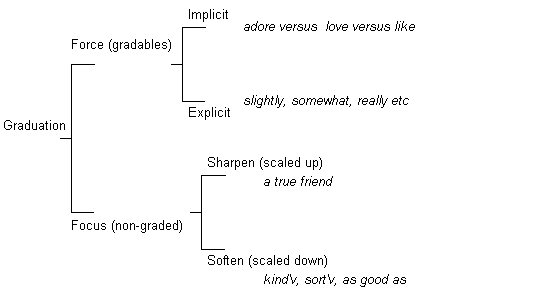


This notion of scaling as a semantic orientation which may operate implicitly across semantic domains leads us to understand more precisely the relationships between values of FORCE (raising and lowering of intensity) and values of FOCUS (sharpening and softening the focus of the valeur relationship). As we have seen, under FORCE, scaling operates unproblematically in the context of gradable categories - values which admit of different degrees of some core meaning. In contrast, under focus, scaling operates in contexts which are not gradable in this sense, or where the communicative objective is not to grade in this way. For example, the state of having made a `break' with someone or something indicated in `a clean break' is not typically construed as gradable. A similar case applies in `a true friend' and `pure folly'. Nevertheless, there is a strong sense that such values have been `scaled up' by the application of the value of FOCUS - there is a sense even of intensification. We find the inverse - a down scaling - operating in the context of values which soften the FOCUS. Thus `kind'v', in `it was kind'v nerve-wracking', lowers the scaling of intensity. From this perspective, FOCUS can be seen as the domain of the application of scales of intensity to ungraded categories. Thus under FOCUS, the scaling, and hence the lowering and raising of intensity, is realised through the semantics of category membership, through a process of narrowing or broadening the terms by which category memberships is determined, through the sharpening or softening of semantic focus.
The system of GRADUATION so far set out is illustrated below.
